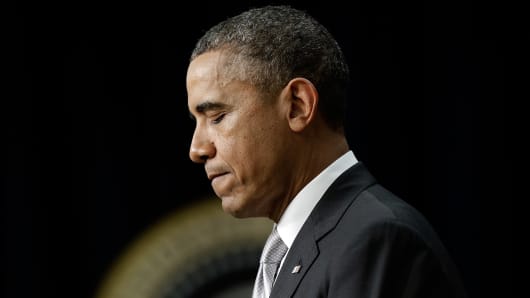And then on September 26, the Health and Human Services Department announced the SHOPs online enrollment would be postponed from Oct. 1 until November, forcing small businesses to enroll using paper forms.
(Read more: Obama defends Obamacare: 'We will make this work')
All of these unexpected changes, on top of the website's glitches, have exacerbated the anxiety and uncertainty felt by our nation's most robust job creators — small businesses.
How can they comply if they don't know what to expect? How can they create jobs if they have to spend hours simply following the many evolving requirements of the law?
(Read more: Shhhhh! Obamacare enrollment error rate still a secret)
But wait, there's more.
Another health-law provision exists that most small business owners don't know about — and it has the potential to create additional headaches for millions of small firms. It is a complex rule that is equally complex to explain, but here is the gist:
The law requires businesses that employ 50 or more full-time or full-time equivalent employees to offer health insurance to their employees. A critical issue is the definition of "employee," but equally important is the issue of which employees are attributed to the business. The answer may be simple for one business with a single owner. However, when an individual shares ownership of multiple businesses, as nearly 40 percent of small business owners with at least 20 employees do, the answer is not always clear.
The determinations of which employees are attributed to a business are made by using the IRS's business-aggregation rules, along with specific information about the ownership of the businesses and the owners' relationships. Many small-business owners are unaware of these rules, and even fewer have the technical knowledge needed to understand and correctly differentiate which employees are attributed to which entity. The result may be that two or more very different businesses with different business models, different employee profiles and different profit margins may be lumped together as one entity under Obamacare.
The health-care law's use of these complex rules can cause real uncertainty for small businesses, such as family-owned businesses or entrepreneurs that have more than one business venture at a time. Some business owners who have ownership in multiple companies may need to comply with the law's employer mandate, taxes, and minimum essential coverage, even if some of their businesses have as few as 5 or 10 employees. But if all of their aggregated business employees add up to 50 or more, they may be subject to the employer mandate.
(Read more: How GOP should react to this mess: Kay Bailey Hutchison)
On Wednesday at 1pm, the House Small Business Committee will examine this complex aggregation rule and discuss alternatives. The lack of guidance and clarity is just another example of a law that is unworkable and bad for small businesses.
— By Sam Graves
Sam Graves (R-Mo.) is chairman of the U.S. House of Representatives' Small Business Committee and U.S. representative of the 6th congressional district of Missouri. Graves, who is a sixth generation family farmer, has served in Congress since 2001 and served as chairman of the Small Business Committee since 2011. Follow the committee on Twitter @SmallBizGOP.


